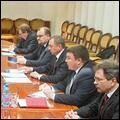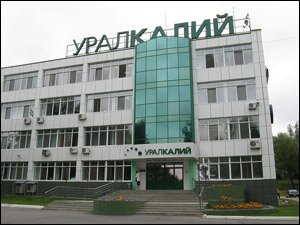Другие материалы рубрики «English»
-
 Ukrainian authorities confirm arrest of two Belarusians suspected of espionage
Ukrainian authorities confirm arrest of two Belarusians suspected of espionage
Two Belarusians were arrested earlier this week on suspicion of spying for Russia. -
 Foreign ministers of Belarus, Venezuela meet in Minsk
Foreign ministers of Belarus, Venezuela meet in Minsk
Makey and Jaua confirmed their countries' commitment to the expansion of bilateral cooperation.
- Sixteen children hospitalized with chlorine poisoning in Minsk
- Lukashenka has phone conversation with Ukraine`s acting president
- Number of living former Chernobyl clean-up workers falls to slightly over 70,000
- Lukashenka touring Chernobyl-affected areas
- Belarus' trade with Ukraine reported down 17.1 percent in January-February 2014
- Leader of Belarusian Popular Front warns of Russia's possible military intervention in Belarus
- Images of Slucak sashes appear on commemorative coins, stamps
- Opposition activist Uladzimir Yaromenak released on completion of three-month jail term
- Given Maidan protests, Belarusian opposition forces’ priority should be to prove that they want peaceful change, activist says
- Writer Svyatlana Aleksiyevich presents her new work at international book fair in Minsk
English
Uralkali stops exports through Belarusian Potash Company
Russia's potash manufacturer Uralkali has announced that it will stop exporting its products through Belarusian Potash Company (BPC).
 Uralkali's board decided on July 29 that the company would export its fertilizers exclusively through a subsidiary trader called Uralkali Trading.
Uralkali's board decided on July 29 that the company would export its fertilizers exclusively through a subsidiary trader called Uralkali Trading.
"We have to note with regret that our cooperation with the Belarusian partners in the framework of BPC has reached a deadlock," said Uralkali CEO Vladislav Baumgertner. "Uralkali has always insisted that exports by all manufacturers should be carried out through a common distribution network."
The executive explained that this "fundamental principle" had been violated by Alyaksandr Lukashenka's presidential edict issued in December last year, which allowed Salihorsk-based potash giant Belaruskali to export its products not only through BPC.
"We have repeatedly drawn the attention of our Belarusian partners to the unacceptability of such actions, which have ruined the basics of our multi-year fruitful cooperation," Mr. Baumgertner said.
"At the same time, we would like to express gratitude to our Belarusian partners for cooperation in the framework of BPC. We remain open to its possible resumption on the mutually beneficial basis in the future," he added.
When reached by BelaPAN on Tuesday morning, BPC declined to comment on Uralkali's decision.
Mr. Lukashenka received Uralkali owner Suleiman Kerimov in Minsk this past May. The Belarusian leader called at the meeting for Belaruskali and Uralkali to "strengthen their unity in sales policy."
"Any attempt at acting separately, especially now that we have established a joint company to sell potash, will only damage Uralkali on the one hand and Belaruskali on the other," Mr. Lukashenka warned. "And we don't hide the fact that we will be strengthening our unity in the potash market."
He said that everyone in Belarus, from the CEO of Belaruskali to the head of state, shared the opinion.
On July 25, Mr. Lukashenka approved the appointment of Alena Kudravets as BPC director general.
Speaking to Ms. Kudravets, he noted that she was well aware of the situation in the potash market. "This is not only the sphere of potash fertilizers, this is the sphere of trade on a global scale," he said. "It is not that you simply come and purchase something and then resell it as we are in the habit of doing. This is big politics in the sphere of sales."
"We should by no means lose Uralkali because we are the most powerful company in the potash market if we are at one with the Russians," Mr. Lukashenka said. "But we shouldn't forget about Belarus' interests as our partner is a private company. The goals of the government and a private company do not always coincide. Anyway, both of us want to sell more and at a higher price. This is natural. And our interests coincide here."
Mr. Lukashenka directed that all potash sales should be taken under control and price policy should be carefully reexamined.
Founded in 2005 by Belaruskali and Uralkali, Belarusian Potash Company is said to control more than 30 percent of the world potash market. A 45-percent stake in the company belongs to Belaruskali and five percent to Belarusian Railroads.




В настоящее время комментариев к этому материалу нет.
Вы можете стать первым, разместив свой комментарий в форме слева